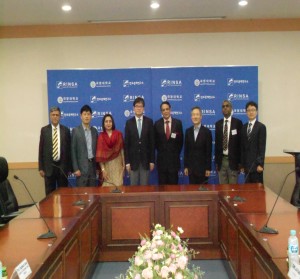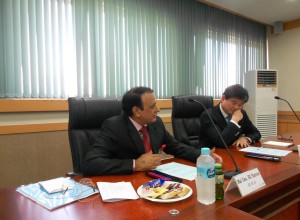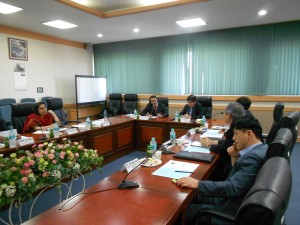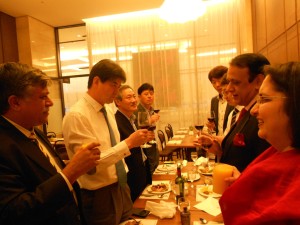USI in collaboration with Research Institute for National Security Affairs (RINSA),KNDU, South Korea is working on a joint project titled ‘Emerging Geo-political Dynamics in the Indo-Pacific Region: Its Implication for Regional Peace and Security’. The project comprises eight members who will be presenting papers on special themes which will be then jointly published in the form of a bilingual book, to be published in English and Korean language. The Indian and the South Korean team members are as follows:
The USI team comprises:-
(i) Maj Gen BK Sharma AVSM, SM & Bar,(Retd), Deputy Director (Research), CS3. (Team Leader). His topic is “Geo-political trends in Indo-Pacific: Implications for Regional Security”
(ii) Cmde Lalit Kapur (Retd), Senior Research Fellow. His topic is ‘Bilateral Cooperation between ROK-India’
(iii) Dr Roshan Khanijo, Senior Research Fellow. Her topic is ‘Nuclear Security Issues: Challenges and Opportunities’
(iv) Cdr MH Rajesh, Research Fellow. His topic is ‘Towards Comprehensive Security Arrangements’
The RINSA team comprises:-
(i) Prof Lee Seok -Soo, Director-General RINSA. (Team Leader). His topic is ‘Emerging Geo-political trends: Imperative In the Asia-Pacific region and Implications for Regional Security’
(ii) Prof Park Min-Hyoung. His topic is ‘Bilateral Cooperation between ROK-India’
(iii)Prof Kwon Yong Soo. His topic is ‘Bilateral Cooperation between ROK-India’
(iv)Prof Chung Han Beonm. His topic is ‘Towards Comprehensive Security Arrangements’
Members of the Project
The First meeting of the group was conducted at RINSA on 10-11 September 2015. The progress of the joint project was discussed and the highlights of the sessions are as follows:-
- First Session-Speakers were Prof Lee and Maj Gen Sharma. They gave their views on the topic ‘Geo-political Trends in the Indo-Pacific: Implications for Regional Security’ Maj Gen BK Sharma described the broad contours of Indo-Pacific region and highlighted the complexities and drivers of conflict and cooperation. Prof Lee described the regional dynamics of South and East China Sea.
- Second Session–Speakers were Prof Park and Cdr Rajesh. They gave the South Korean and the Indian perspective respectively, on the topic ‘Bilateral Cooperation between ROK-India’.
- Third Session–Speakers were Prof Y S Kwon and Dr Roshan Khanijo. They gave their presentation on the topic ‘Nuclear Security Issues: Challenges and Opportunities’ Prof Y S Kwon discussed the North Korean Nuclear Challenge and Dr Roshan Khanijo discussed the issues related to nuclear proliferation and nuclear terrorism emanating from Pakistan .
- Fourth Session–Speakers were Prof HB Chung and Cmde Lalit Kapur and they gave their perspectives on the topic ‘Towards Comprehensive Security Arrangements’; the former highlighted the multilateral approach whereas the latter discussed the bilateral approach to comprehensive security .
Team Leaders from India and South Korea
Interactive Session
Each session included an interactive and detailed discussion on various aspects of regional peace and security in the Indo-Pacific region. After the session the Indian delegation was invited for a reception. The next round of discussions is being scheduled at the USI in December 2015
Reception





